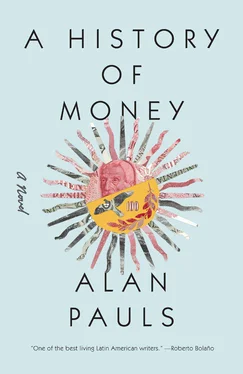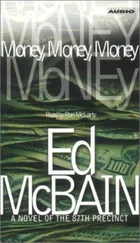Yes, everything tends to the shady, the double, and what happens on one side of the mirror isn’t necessarily known on the other, even when the repercussions might be felt there, might make an impact or even pose a danger. One winter’s night at the Hotel Gloria, his father, taking more trouble than he has in the four preceding days of their vacation in Rio de Janeiro, hurries him into the shower, has his dinner brought up to the room, puts him to bed and tucks him in, and, after turning out every light but the one on the nightstand, tells him that tonight, also for the first time in four days, he’s going out on his own, without him, and that it’s very possible he’ll be back late. When he gets back, he wants to find him asleep. And then, raising his voice a little, exaggerating the note of admonition until he’s almost singing, he delivers a string of assorted warnings and pieces of advice, at times so varied — don’t raid the minibar; don’t use the bed as a trampoline; be careful of the flock of toucans that might suddenly invade the room, thirsty for revenge for the fake toucan food they gave them that afternoon at the jardim botanico, really a few crumbs of old nougat that he accidentally smuggled from Buenos Aires in the pocket of his pants — that he, covered up to his chin and still terrified by the prospect of staying behind on his own, can’t help laughing. But why can’t he go with him? Why can’t they go out together, just like last night when they went to the juice bar on the beira-mar, the seafront, or the night before that, when they went to the cinema to see O dolar furado —he repeated the title loudly on the way out — the Portuguese-dubbed version of Un dólar marcado, the western starring Giulianno Gemma they’ve already seen together half a dozen times in Buenos Aires? “It’s grown-up time,” his father says, putting a hand just liberated in protest back under the sheet. “I have to see a friend.” “Now? At night?” he asks. Though he could swear that he’s only asking for information, a routine explanation, a faint but uncontrollable trembling in his lower lip tells him that the matter is more serious than that, that he might be about to cry. “It’s a friend who owes me money,” says his father. And he leans toward him, kisses his still-damp hair, and heads for the door, putting on his blue blazer as he walks. He sees him pause in the hallway by the door, where he takes one last look at himself in the mirror and, with two sharp tugs, rescues his shirt’s white cuffs, which had gotten caught under the sleeves of his jacket. Then he opens a dresser drawer, takes out a dark package, studies it for a few seconds with his head bowed, puts it in a pocket, and leaves.
He listens to his steps, which are muffled by the carpet, growing more distant and then suddenly quickening into the cocky little trot he always breaks into at the top of a flight of stairs, and he closes his eyes in resignation. It takes him a long time to get to sleep. He lies still in the bed, just as his father left him, ignoring the temptations stalking the room’s darkness, the TV, his comic books, the garoto chocolates in the minibar, and his collection of Brazilian cruzeiros, which he’s been accumulating since the beginning of the trip from change they’ve been given, and which are due their first audit. He’s scared that if he moves, something in his father’s life — in the mysterious, dangerous life he’s decided to lead without him, away from him — might change, or be endangered. This is the way he’s lying, as rigid as a dead man, as the dead man who can still make his head ring with the crostini-crackling that tormented him for whole summers when he’s laid out in his coffin eight years later, when sleep creeps up on him in the hotel’s dense silence, after it’s begun to grow light outside and the old, tattered exhausts of the first buses full of workers have started roaring two floors below. His father wakes him up, as usual, by ruffling his hair, hair that the pillow has straightened at will, according to the vagaries of sleep, and that’s now electrified, shooting locks charged with static in every direction. “Up, sleepyhead, or we’ll miss breakfast,” he says, standing up and turning his back to him, and then emptying his pants’ pockets onto the nightstand. He covers his eyes so that the light that bursts into the room doesn’t blind him. Then, very carefully, he opens his fingers just a tiny bit and watches him as though spying through the cracks of a blind: except for the blazer, which is hanging on the back of a chair, he’s wearing the same clothes he had on when he went out last night.
This scene is replayed three times, identically, over the course of the trip, but the cloud of mysteries it brings with it pursues him for years. He can never understand how his father can call someone who owes him money a “friend.” It’s not the notion of debtors that he finds problematic; in fact, that’s not new to him. How many times has he heard his father shout that people owe him money? Everyone owes him money, all the time. It’s as though the world were split in two: his father, alone, and the huge wave of debtors that persecutes him. What he can’t understand is why he declares it the way he does. There’s an element of complaint in it (as though the money he’s owed is a curse that can only be cast by yelling), but also a certain disconcerting pride that transforms the status of creditor into a privilege, a miraculous gift of the type that fate bestows on the heroes of apocalyptic films, like being fertile in a world sterilized by nuclear radiation, or the ability to speak or think on a planet populated by beasts. It’s really the money itself that he finds disturbing. He can never imagine friendship and money coexisting without feeling scandalized. It’s as though, by dint of some extraordinary cosmic misalignment, two radically foreign kingdoms have come together in an unknown territory, and it’s anybody’s guess what sort of unwonted plants and creatures will result. And since it’s impossible for him to grasp, he naturally starts to jump to conclusions.
His father said “a friend” to ease his mind, to alleviate the worrying effect of “owes me money,” the only charged and therefore true part of the sentence. But how can “a friend” share any reasonable sequence of events with the dark package that his father takes out of the drawer and puts in his pocket each of the three nights he goes out alone, leaving him in the eye of a storm of omens from which only sleep can free him? If “a friend” can’t share a phrase with “owes money,” what kind of phrase would it take to unabashedly unite “a friend” and “a revolver”? Because that’s what his father takes with him every time he goes to see the friend who owes him money, a revolver, an 1873 Colt Peacemaker six-shooter with a walnut handle, just like the one Montgomery Wood, the hero of O dolar furado, uses when he tries to avenge his brother’s murder. Which means his father is in danger. How did he not think of it earlier? That’s obviously why he goes out alone. He leaves the Hotel Gloria, travels the length of the city in a taxi — one of the demented race cars that serve as taxis in Rio de Janeiro — and, with his Colt 1873 at the ready, tiptoes into a gloomy, unfamiliar apartment where everything from the arrangement of the furniture to the location of every last light switch and bell, everything that could either serve his purpose or hinder it, is obedient to someone else’s will: that of the friend who owes him money. Which is to say his worst enemy, who won’t only not return his money but will make the most of his local advantage, will surprise him, split his head open with the sharp edge of a rock or a trophy, and leave him sprawled on the floor, drowning in his own blood. Sometimes, years later — long after the enigma has been solved, when there’s no longer anything to fear — he replays the scene to himself, more out of the peculiar inertia of internal fictions than anything else, and he’s flooded with a very potent retrospective terror that can change the past instantaneously, at the lightest of brushes, and he lies awake for hours, his eyes wide open, until, when he’s as exhausted as he was at eleven years old, he hears the frenzied cawing of the birds breaking the morning silence.
Читать дальше












